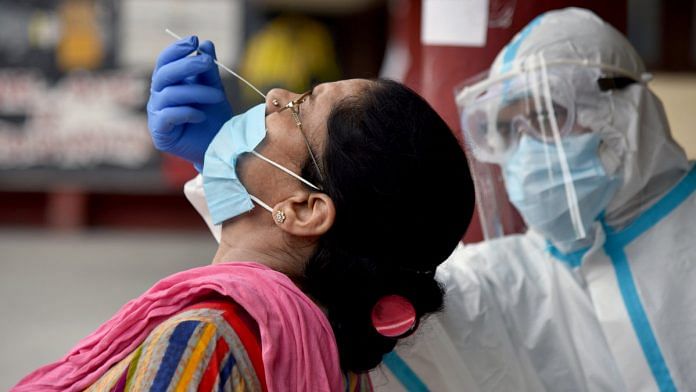New Delhi: The Covid-19 situation in the national capital has improved manifold according to numerous reports — something Chief Minister Arvind Kejriwal has called a “turnaround”. But at the same time, the Delhi High Court has observed that almost 50 per cent of Delhi’s RT-PCR testing capacity is lying unutilised.
The reason, Delhi’s district magistrates say, could be that fewer people are coming forward to get tested.
The number of cases reported per day in Delhi has gone from between 1,000 and 2,000 per day to below 1,000 — Monday, Delhi recorded 613 infections, its lowest per day increase in two months, while Tuesday, 1,056 cases were reported.
However, the high court pointed out Monday that Delhi, which is capable of conducting 11,000 RT-PCR tests a day, did not conduct more than 6,000 tests a day between 15 and 23 July. This has led to concerns that the Aam Aadmi Party government is celebrating the reduction in Covid-19 numbers too early.
Kejriwal Wednesday defended his government’s approach, saying it was following existing guidelines and that authorities had been directed to conduct follow-ups through RT-PCR testing on all those who displayed symptoms but returned a negative antigen test. The Delhi government is carrying out both RT-PCR and rapid antigen tests.
“Existing guidelines say that if any patient’s antigen test is negative but they have symptoms, RT-PCR test must be done on them. I directed the officers today to ensure strict compliance of these guidelines,” the Delhi CM tweeted.
Existing guidelines say that if any patient’s antigen test is negative but has symptoms, RT-PCR test must be done on him. I directed the officers today to ensure strict compliance of these guidelines.
— Arvind Kejriwal (@ArvindKejriwal) July 29, 2020
Also read: India, Israel collaborate to develop rapid testing for Covid-19 in under 30 seconds
The court’s observations
While Delhi was conducting at least 20,000 tests per day (combined RT-PCR and rapid antigen tests) at one point, the figure for Monday was 11,506. After the court’s tough questions, the Delhi government Tuesday conducted 18,544 tests.
RT-PCR, which gives a positive result only if the virus is present in the bloodstream, is considered the gold standard, while rapid antigen tests can directly detect the presence or absence of an antigen.
The Delhi High Court had cited the results of the recent sero-survey, which showed that most of Delhi’s Covid-19 patients were asymptomatic, to say that conducting more RT-PCR tests is important. However, the Delhi government said those diagnosed with SARI (severe acute respiratory illness) would have to undergo antigen tests first, prompting the court to ask the government to “strictly follow ICMR guidelines”.
The ICMR told the court that conducting antigen tests in such a situation was a deviation from its guidelines, which recommend RT-PCR for such individuals. Antigen tests, it said, are suitable for point-of-care testing and directly detect the presence or absence of an antigen.
This means antigen tests can accurately detect how far the infection has spread in a specific neighbourhood or area. It can also detect live cases and help contain the spread.
Data accessed by ThePrint earlier showed that almost 18 per cent of negative rapid antigen test results sent for follow-up RT-PCR tests came back positive.
DMs say people reluctant to get tested
B.M. Mishra, district magistrate of South Delhi, explained the drop in RT-PCR numbers by saying people who are at risk have already been tested, and there are fewer takers for it now.
“Now, high-risk and infected people have reduced, and normal categories are obviously less inclined to take the test,” Mishra told ThePrint.
Rahul Singh, DM of South-West Delhi, echoed his counterpart’s thoughts.
“We test everyone who is coming for a test in the dispensaries in our district,” said Singh, adding that perhaps lesser people were turning up for tests.
Another DM, requesting anonymity, said: “It’s not like we aren’t testing… It is just that when there was more panic, a larger number of people were willing to get tested. Besides, more people were getting tested when the door-to door survey was on.”
Also read: Test pool? Group testing for coronavirus could be the fastest way to increase screening



